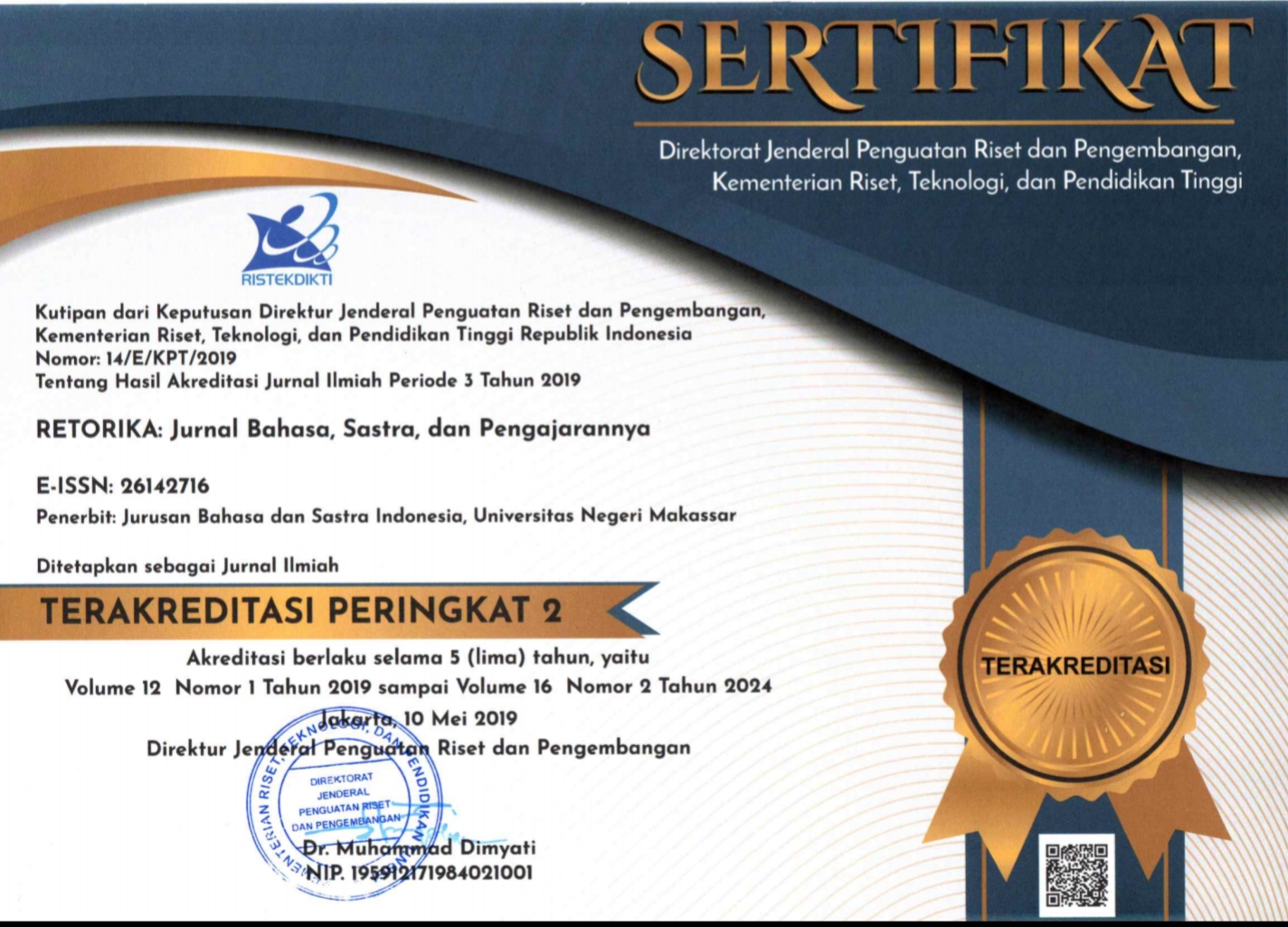INTEGRATION OF TRADITIONAL ECOLOGICAL KNOWLEDGE IN-TO PRIMARY SCHOOL LEARNING
(1) Universitas Sebelas Maret
(2) Universitas Sebelas Maret
(3) Universitas Sebelas Maret
(4) Universitas Sebelas Maret
(*) Corresponding Author
DOI: https://doi.org/10.26858/retorika.v13i2.13993
Abstract
This research was conducted to understand the perception of people in Tawangmangu, Central Java in terms of the potential of teaching TEK in primary schools, challenges, and teaching strategies. We conducted semi-structured and unstructured interviews with 77 participants (local TEK experts, local communities, educators, and education officials). TEK in Tawangmangu includes folktales, ceremonies, offerings, typical food, terraced farming, intercropping systems, irrigation systems, crop management, herbal medicine, traditional house, and social system. Participants supported the idea because the TEK began to become extinct and identified its delivery in formal schools as a bridge to maintain it. Factors identified as obstacles are limited study time, limited access to subject matter, lack of political support, and differences in the characteristics of knowledge transfer between science and TEK. Participants claimed that the most appropriate strategy for teaching it in primary schools was to bring students closer to the real context. To teach it, the teacher chooses a number of contextual learning methods that are considered suitable, like field trips, role playing, task-based learning, and project-based learning.
Keywords
Full Text:
PDFReferences
Armstrong, M., Kimmerer, R.W., & Vergun, J. (2007). Education and Research Opportunities for traditional ecological knowledge, Frontiers in Ecology and the Environment, 5(4),12-14.
Berkes, F. (2004). Rethinking community-based conservation.Conservation Biology, 18:621–630.
Bogdan, R. & Biklen, S.K.(2007). Qualitative Research for Education: An Introduction to Theories and Methods, 5th Edition, NY: Pearson
Brody, B.A. 2010. Traditional ecological knowledge and Intellectual Property. Kennedy Institute of Ethics Journal, 20(3), 231-249.
Cagivinaka, V. (2016).Reorienting education and indigenous Fijian ecological knowledge: An analysis of indigenous Fijian students’ traditional ecological knowledge of environmental sustainable practices. International Journal of Educational Research and Development, 5(1), 10-18.
Chaipar W, Sakolnakorn, T.P.N., & Naipinit, A. (2013). Local Wisdom in the Environmental Management of a Community: Analysis of Local Knowledge in Tha Pong Village, Thailand, Journal of Sustainable Development, 6(2), 17-22
Cohen, L., Manion, L., & Morrison, K. (2007).Research Methods in Education, London – New York: Routledge.
Gomez-Baggethun, E., Corbera, E., & Reves-Garcia, V. (2013). Traditional Ecological Knowledge and Global Environmental Change: Research findings and policy implications, Ecology and Society, 18(4), 72-80.
Houde, N. (2007). The Six Faces of Traditional Ecological Knowledge: Challenges and Opportunities for Canadian Co-Management Arrangements, Ecology and Society 12(2): 34, http://www.ecologyandsociety.org/vol12/iss2/art34/
Karjala, D.S. (2012). Sustainability and Intellectual Property Rights in Traditional ecological knowledge. Jurimetrics 53: 57-70. International Journal of Cultural Property 18(2): 143-178.
Kim, E.J.A. (2012). Studying the Integration Level of Traditional Ecological Knowledge in Science Education: A Case Study in British Columbia, Canada in Grade 7 and 8 Official Curriculum Documents, International Journal for Cross-Disciplinary Subjects in Education (IJCDSE), 3 (2), 750-754
Kurnilasari, D.T., Yahanam, A., & Rahim, R.A. (2018).Indonesia’s Traditional ecological knowledge Documentation in Intellectual Property Rights’ Perspective, Sriwijaya Law Review, 2 (1), 110-130
McCarter, J. & Gavin, M.C. (2011).Perceptions of the value of traditional ecologicalknowledge to formal school curricula: opportunitiesand challenges from Malekula Island, Vanuatu. Journal of Ethnobiology and Ethnomedicine, 7 (3), 1-14..
Nofrita, M., Hermawan, & Putri, D. (2019). Ritual Speech Of Lukah Gilo Tradition of Bonai Society: Value and Social Fungtion Text Study, Humanus, 18 (1), 80-87.
Nuraini, L. (2018). Integrasi Nilai Kearifan Lokal dalam Pembelajaran Matematika SD/MI Kurikulum 2013, Jurnal Pendidikan Matematika, 1 (2), 1-17
Peow, S.H. (2015). Malaysian Chinese stories of hard work: Folklore and Chinese work values, International Journal of Asia Pacific Studies, 11 (2), 1–16
Reid, A. Teamey, K., & Dillon. J. (2004). Valuing and utilizing traditional ecological knowledge: tensions in the context of education and the environment, Environmental Education Research, 10 (2), 237-254
Sumarwati. (2015). The Traditional Dhukutan Ceremony in TawangmanguKarnaganyar Regency, Indonesia. International Indonesian Forum.Volume 7, 4.
Tsuji, L. J. S., & Ho, E. (2002). Traditional environmental knowledge and western science: in search of common ground. The Canadian Journal of Native Studies, 22(2), 227-260.
Umbara. (2015). Integrasi Nilai-Nilai Kearifan Lokal Budaya Masyarakat dalam Pembelajaran Matematika Realistik, Kumpulan Makalah Seminar ACER-N Universitas Pasundan, 1, 25-28
Wati, M.A., M., Sumarwati, Saddhono, K. (2018). Javanese Literature and Culture Value in Prosesion of Traditional Ceremony Dhukutan at Nglurah Village, Tawangmangu Regency, Jawa Tengah, Hortatori Journal, 2(1), 45-56
Whyte, K.P. (2013). On the role of traditional ecological knowledge as a collaborative concept: a philosophical study, Ecological Processes 2013, 2 (7), 1-12.
Wright, W., Wang, Y., & Tang, Y. (2013). Traditional Ecological Knowledge in Nontraditional Communities: A Case Study in Jiuzhaigou National Park, Journal of Park and Recreation Administration, 31(3), 77-95
Yin, R.K. (2014).Case Study Research Design and Methods (5th ed.). Thousand Oaks, CA: Sage
Article Metrics
Abstract view : 871 times | PDF view : 119 timesRefbacks
- There are currently no refbacks.
Copyright (c) 2020 Sumarwati Sumarwati

This work is licensed under a Creative Commons Attribution-NonCommercial 4.0 International License.
Published by:
Department of Indonesian Language, Faculty of Languages and Literature, Universitas Negeri Makassar in cooperate with Asosiasi Dosen Bahasa dan Sastra Indonesia (ADOBSI) and Ikatan Program Studi Pendidikan Bahasa dan Sastra Indonesia (IKAPROBSI).
Address: Department of Indonesian Language Office, DG Building Second Floor, UNM Parangtambung, Daeng Tata Raya Street, Makassar, South Sulawesi, Indonesia
 Email: retorika@unm.ac.id
Email: retorika@unm.ac.id

RETORIKA: Jurnal Bahasa, Sastra,dan Pengajarannya is licensed under a Creative Commons Attribution-NonCommercial 4.0 International License.
















